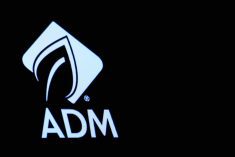Give yourself 2 points for every right answer: 1.c) 2.b) 3.a) 4.b) 5.c) 6.a) 7.c) 8.c) 9.a) 10.b) 11.c) 12.c)
If you scored 20 to 24:
You run a tight ship – your information is pretty safe.
If you scored 14 to 18:
You know the basics, but there is more you can do to protect yourself.
Take extra precautions to protect your personal information. Maybe you don’t share your PIN with anyone – but are you sure your PIN is a number that would be hard to guess? Avoid using your birthday or part of your phone number.
Read Also

GATE project nears 50 per cent of fundraising goal
Farmers at the SaskWheat annual meeting hear GATE raises $42.65 million, but questions continue over cost of Cereals Canada project.
Since email isn’t always secure, you know better than to send private information, like your credit card number, this way – but remember, not all websites are secure either.
Make sure you are shopping on a secure website or look for merchants who use added security features, like Verified by Visa, before entering your credit card information.
Also, shred your personal information. There is only one of you, let’s keep it that way.
If you scored under 14:
Be careful – you’re sharing too much!
Take the time to protect what is important – your identity, your money and yourself. Don’t be so carefree with personal information.
Never lend your cards to anyone, or give anyone your PIN. Even better, memorize your PIN so you don’t need to write it down. And, never carry your PIN with your wallet.
Unless you initiated the call, do not provide your credit card number over the phone.
Though email is a convenient way to contact someone, your financial institution will never ask you to verify your banking information that way. And remember, that king from a far off-land asking you to share your bank account information is not actually going to make you rich.
In support of Fraud Prevention Month, TD Canada Trust developed the following quiz to help Canadians determine how fraud savvy they are and learn what they can do to help protect themselves.
TD CANADA TRUST FRAUD PREVENTION QUIZ:
1 What does a criminal need to make a copy of
your card and access your account?
a) The card – my Personal Identification Number (PIN) is on the stripe;
b) My PIN– they can use a blank card;
c)The card and my PIN together;
2 A customer’s PIN is located on the magnetic
strip on their card a) True b) False
3 How of ten should you cover the keypad when
you enter your PIN? a) Always
b) Sometimes c) Never receipts and statements;
5 A salesperson asks you for your PIN, saying their new
keypad doesn’t stretch that far and they have to enter it themselves. You:
a) Give them your PIN and debit card;
b) Declinetogivethemyour PIN but continue your transaction and move around the counter to enter your PIN yourself;
c) Leave and contact your financial institution;
6 How of ten should you check your banking and
credit card statements for discrepancies?
a) Always b) Often c) Never
7 You do your banking online, so when you
receive your statement in the mail you should:
a) Throw it away without
opening it; b) Read it and put it in the recycling;
c) Read it and shred it;
8 How secure should you be with your debit and credit
cards?
a) Fairly secure – don’t loan
them to strangers, but it’s OK if family and friends borrow them;
b) Don’tsweatit. Ifsomeone steals them you will be reimbursed;
c) Treat them like cash and know where they are at all times; 9 You go to pay for lunch and your credit card is
gone. What should you do?
a) Call your credit card company immediately to report it lost;
b) Dineanddash;
c) Drop by your bank branch a few days later to report it missing;
10 What should you do if you receive an email from your financial institution asking for your banking information? a) Enter the information; b) Delete it because your
financial institution would never ask for your banking information via email;
c) Contact the email sender to find out more;
11 What should you do with expired identification and credit cards? a) Throw them away;
b) Save them because you like the way you look in the photo;
c) Shred them;
12 You sell something online to a stranger who sends you a cheque for too much and asks you to wire the difference. You should: a) Do as they ask because you
trust the selling site; b) Doastheyaskbecauseif
the cheque’s no good your bank will reimburse you;
c) Cancel the transaction and rip up the cheque;














